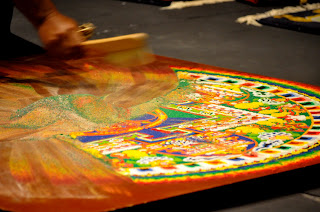The God of Destruction

This sermon was preached on the morning on November 15th 2015, a few days after the terrible attacks in Paris on the night of November 13th. The sermon was written before those attacks, but required some last minute tweaks to take them, and their effect upon us, into account. In researching and writing it, I am indebted to another sermon I found online preached by the Rev'd Dr Willimon in 2012 - A World Rocked by God . If you have the time, I highly recommend reading it. Part of me toyed (for a moment only, mind) with reading out his sermon instead of writing my own. I'm sure you'll see the sermon below owes much to it. The readings were Daniel 12:1-3 , Hebrews 10:11-25 & Mark 13:1-8 . Before I start my sermon, I’d like to invite you to take some time to look around you. Notice the walls, the ceiling, the beautiful stained glass, the intricate tiling on the floor, the pew on which you are sitting. All this? With all the years it has been here, and...





